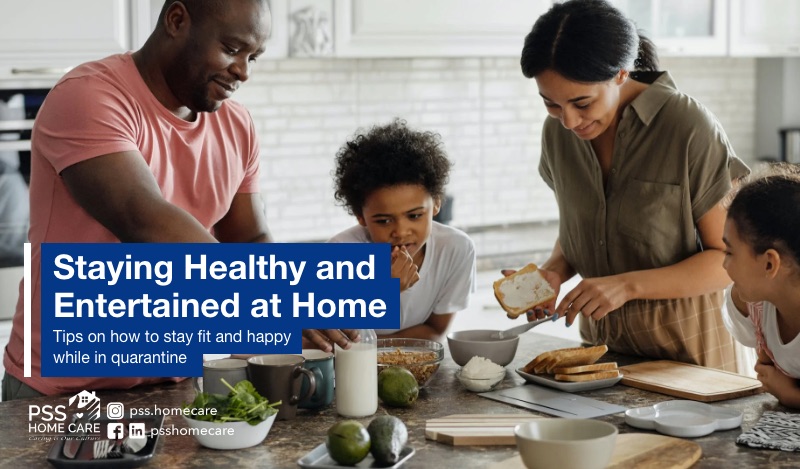A Woman’s Guide to Life After Menopause Menopause, which occurs...
Read MoreStaying Healthy and Entertained at Home
Tips on how to stay fit and happy while in quarantine

There has been a recent surge of Covid-19 infections in the United States. On November 20, 2020, the US saw its highest number of infected individuals for a single day — more than 187,000 people were hospitalized due to Covid-19. Because of this uptick in Covid-19 infections, additional restrictions have recently been put in place for New York City. These include:
- Public schools are closed for face-to-face or in-person instruction. Students have started studying remotely as of November 18, 2020.
- Restaurants, bars, gyms, and other establishments should close at 10 p.m.
- Parties held at private residences should not have more than 10 guests.
Studies find that Covid-19 patients who are 80 and older are hundreds of times more likely to die from the illness compared to Covid-19 patients who are under 40. This is why it’s imperative for older individuals — as well as those caring for them or living with them — to protect themselves from Covid-19 by staying at home as much as possible.
Here are some tips for older individuals, their caregivers, and their family members on staying healthy and happy while in quarantine.

1. Make a menu — and make it fun!
Pandemic or not, it’s important to always eat, drink, and cook well! Having a healthy diet won’t just help keep you protected from Covid-19, it will also help your body build resistance that can fight off infections and lower your risk of developing other illnesses such as diabetes, heart disease, and obesity.
A good way to keep eating healthy is to make cooking a fun activity that everyone can take part in. It might not be realistic to prepare and cook all of your meals due to other responsibilities and activities, but it’s a good idea to do so even for one or two days.
When you plan out your breakfasts, lunches, and dinners, make sure to:
- Prioritize fresh ingredients — eat a lot of fruits and vegetables!
- Consider portion sizes well when meal prepping to avoid food waste.
- Use ingredients that have a long shelf life, such as legumes and rice.
- Before you buy more ingredients, make sure to see what you already have in your pantry and in the fridge. Check the expiry dates on your food products.
- Don’t skimp on the herbs and spices! But do skimp on the salt.
- Check out new recipes to try and make on YouTube.
- Plan on making healthier snacks, such as dried fruit and chia pudding.

2. Make time for family entertainment
Despite the many wonderful games and activities that we can do on game consoles, there’s still something magical about playing board games and putting together a jigsaw puzzle. After all, these sit-down activities are not just fun, but they can help keep the brain in tip-top shape and bring cross-generational family members together.
Aside from the classic Monopoly, chess, and checkers, you can also check Sequence, Ticket To Ride, and other highly recommended games for seniors on Amazon.
It’s also a great idea to schedule a family movie night with your loved ones — make sure that your movie selection is something that everyone can enjoy. And don’t forget the popcorn!

3. Move around
Stay active at home!
When you’re staying at home more, it’s not difficult to find yourself or your older loved ones sitting down more than usual. But it’s important to stay active especially during the pandemic because it will help keep your immune system strong. Regularly exercising is also great for balance and flexibility for older individuals.
The National Institute on Aging (NIH) has videos on exercises that even older individuals can do at home. Check out their balance, strength-building, and flexibility exercises. But here’s a very important note: ask your physician or physical therapist first about which activities you and your older loved ones can do.
Here are some helpful tips to make exercising more enjoyable and regular:
- Wear comfortable clothes and shoes. Choose the correct clothes and shoes for the activity that you’ll be doing.
- Establish a regular routine. To be able to get your older loved ones to participate more actively, learn about what time they’re more motivated to workout, what activities they like doing, and how they want to exercise (for example, find out if they’re comfortable exercising with the whole family or with just one or two people).
- Track your progress. Jot down your progress. Take note of how your exercise went — write down if you’ve had a good exercise day or otherwise.
- Set your goals. No goal is too small or too big. And when you achieve them, don’t forget to reward yourself!

4. Be social (but physically distant)
Keep being connected while staying physically distant. Isolation and loneliness are linked to many health issues, including high blood pressure, depression, cognitive decline, and heart disease. It also lowers the immune system, which could increase the risk of Covid-19 infection.
Here are some things that you can do to keep connected while you stay at home:
- Call your loved ones. It’s the perfect time to reconnect and check up on family members, friends, and colleagues. Do it regularly and spread love and laughter as often as possible!
- Organize a virtual party. There are many activities that you can do on Skype or Zoom, such as virtual movie nights, game nights, or even karaoke nights.
- Be helpful. There may be other older individuals in your neighborhood who need to be checked upon. Call them regularly and ask them if they’d need help with groceries or other errands.

5. Take mental health breaks
The Covid-19 pandemic has brought forth a new reality — one that can be stressful and anxiety-inducing. As pandemic-related changes and challenges continue to occur, it’s important to keep your mental health a priority.
Here are some tips to keep you and your loved ones mentally healthy during tough times:
- Jot down what your grateful for each day. Big or small, practice writing down your blessings every day.
- Set a mental health date with your loved ones at home. This is where you and your loved ones can share and listen to what each other is feeling or thinking without fear of judgment or criticism. This can help you better understand what everyone in your family is going through.
- Take a break. Take some time to destress if you’re feeling anxious or worried.
- Laugh. Enjoy a funny movie or connect with someone who always makes you laugh.
- Ask for help — and encourage those around you to do the same. When you feel overwhelmed, let your loved ones know how you’re feeling. Let your family members, especially older individuals, know that they can share how they’re feeling, too. This way, everyone can help address any pain points by offering practical solutions or an emphathetic ear.
Check out our other articles
Monkeypox Overview: What It Is, Who’s At Risk, and What You Need to Know
Monkeypox Overview:What It Is, Who’s At Risk, and What You...
Read MoreLiving and Caring: Improving Patient and Caregiver Quality of Life with Respite Care
Living and Caring: Improving Patient and Caregiver Quality of Life...
Read MoreHappy Lives with HHAs: How to Help the Elderly with Loneliness
Happy Lives with HHAs: How to Help the Elderly with...
Read More



